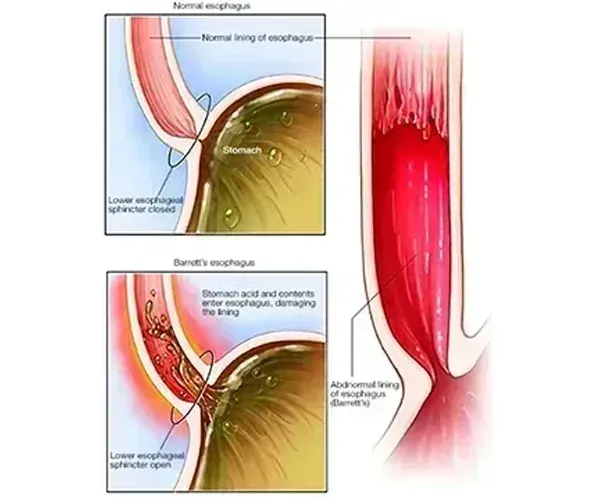

Barrett’s Esophagus
Barrett's esophagus is a condition that affects the esophagus (the tube that carries food from the mouth to the stomach). When people have Barrett's esophagus, the normal cells in the lower part of their esophagus are replaced by a different type of cell.
Barrett's esophagus is usually caused by acid reflux. Acid reflux is when the acid that is normally in your stomach backs up into the esophagus. Many people with acid reflux never get Barrett's esophagus, but some do.
If you have had acid reflux for a long time, it's important to know if you also have Barrett's esophagus. That's because Barrett's esophagus can later turn into pre-cancer or cancer of the esophagus.
Barrett's esophagus does not cause any symptoms. But people usually have symptoms from their acid reflux, such as:

Yes. Your doctor can do a test called an upper endoscopy to check for Barrett's esophagus. Your doctor might do this if you have had acid reflux for more than 5 years.
During an upper endoscopy, a doctor puts a thin tube with a camera and light on the end into your mouth and down into your esophagus.
He or she will look at the lining of the esophagus and take a small sample of it. Another doctor will look at the cells under a microscope to see if you have Barrett's esophagus.
Barrett's esophagus is treated by reducing or getting rid of a person's acid reflux. Treatment does not usually cure Barrett's esophagus, but it keeps it from getting worse.
Your doctor will likely give you medicines to stop your stomach from making acid. He or she might also recommend that you:
Yes. If you have Barrett's esophagus, you should follow up with your doctor. He or she will keep checking that your Barrett's esophagus does not turn into pre-cancer or cancer.
One potential complication of Barrett's esophagus is that, over time, the abnormal esophageal lining can develop early precancerous changes. The early changes may progress to advanced precancerous changes, and finally to frank esophageal cancer. If undetected, this cancer can spread and invade surrounding tissues.
However, progression to cancer is uncommon for any individual patient; studies that follow patients with Barrett's esophagus reveal that fewer than 0.5 percent of patients develop esophageal cancer per year. Furthermore, patients with Barrett's esophagus appear to live approximately as long as people who are free of this condition. Patients often die of other causes before Barrett's esophagus progresses to cancer.